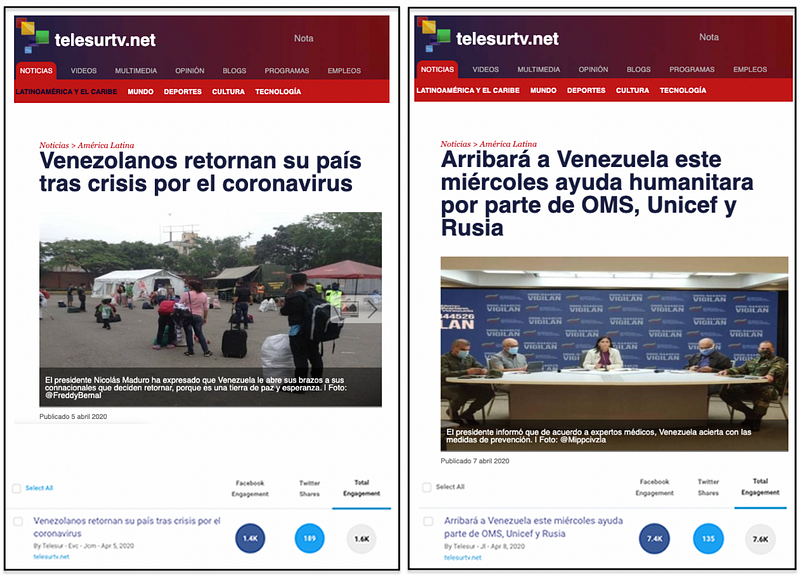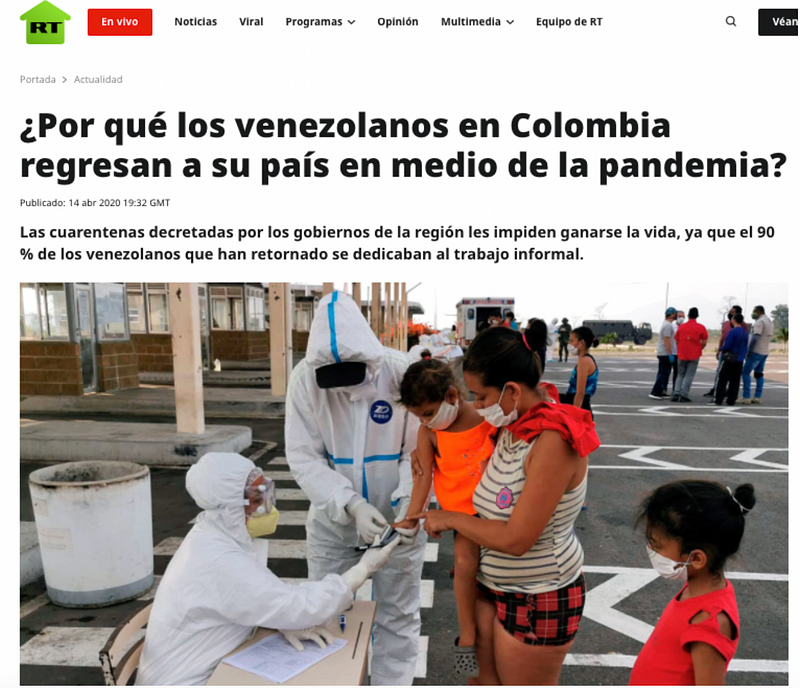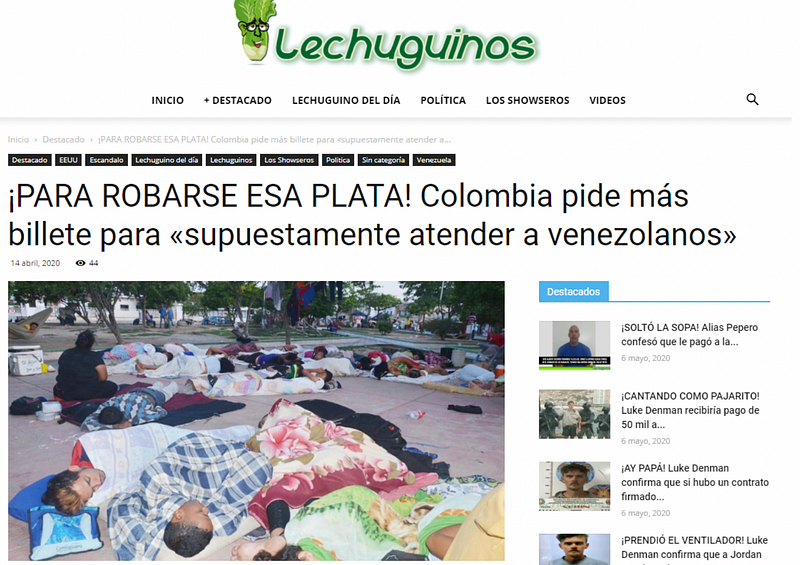Maduro regime exploits return of Venezuelan migrants during pandemic
Pro-Maduro blogs and outlets claim Venezuelans
Maduro regime exploits return of Venezuelan migrants during pandemic

Pro-Maduro blogs and outlets claim Venezuelans are returning home en masse due to xenophobia, inferior living conditions abroad

Venezuelan and Russian state media, as well as pro-Maduro blogs, are using the return of Venezuelans to their home country amid the novel coronavirus pandemic to push the narrative that the situation in Venezuela is better than in other countries, which they argue have worse healthcare and rampant xenophobia.
Since 2015, over 4.5 million Venezuelans have left the country due to the ongoing economic, political, and humanitarian crisis. Many have settled in neighboring countries, such as Colombia, which hosted an estimated 1.6 million Venezuelan migrants as of December 2019. But amid the pandemic, social isolation measures and stalled economic activity in these host countries have left some migrants with no source of income and facing eviction. As a result, between 9,000 and 10,000 Venezuelans have returned home since the first week of April 2020, where they can save some money by staying with family and be surrounded by a larger social support network.
The number of migrants returning to Venezuela is a small fraction of total migrants living abroad. Nicolás Maduro and pro-Maduro outlets have previously drawn disproportionate attention to the number that have returned home, claiming those who come back serve as evidence that the reality of living in Venezuela under Maduro is not as dire as it seems. Now, with the COVID-19 outbreak, the regime and its supporters have doubled down on their efforts to portray the regime’s treatment of returning migrants as superior to that of the migrants’ host countries, despite evidence that returning migrants are facing dire humanitarian conditions made worse by the pandemic.
Coming home to “open arms”
State-backed Venezuelan, Russian media, and other pro-Maduro websites have all pushed narratives exploiting the return of some Venezuelan migrants amid the coronavirus pandemic.
Between April 5–7, when the first wave of thousands of Venezuelans from Peru, Ecuador, and Colombia crossed the Venezuelan border, these outlets began publishing articles claiming Venezuela was well-prepared to receive returning migrants, despite ample evidence to the contrary. Local and international NGOs have denounced the lack of running water, electricity, and reliable healthcare services in Venezuela. In response, some members of the Maduro regime accused these NGOs of being “traitors” and “disguised fascists.”
On April 5, regime-backed broadcaster Telesur claimed a group of Venezuelans returned from Chile, Colombia, Ecuador, and Peru after enduring “precarious” healthcare systems struggling to fight the COVID-19 outbreak. As a socialist country, Venezuela has a public universal healthcare system, unlike some of the countries to which Venezuelan migrants head. Even before the arrival of the virus in Venezuela, regime officials positioned themselves as leaders of a country that provided free healthcare to all its citizens. The system, however, has been battered due to the ongoing economic crisis — a significant point not mentioned in the Telesur article. The article quoted Luis Parra — who was illegitimately installed as the head of the National Assembly by the regime — who claimed Venezuelans migrants suffered “maltreatment, xenophobia, and lack of assistance” in Brazil and Colombia. The Telesur article also quoted Maduro himself, saying Venezuela will welcome “marginalized” Venezuelans with “open arms” to a land of “peace and hope.”
Two days later, on April 7, Telesur published an article quoting Maduro’s vice president, Delcy Rodriguez, who said the Maduro regime expected 15,000 Venezuelans to return home, fleeing “racism” in Peru, Ecuador, and Colombia. According to a query using the monitoring tool BuzzSumo, the first article garnered 1,600 engagements on Facebook and Twitter combined, while the second garnered 7,600 engagements.

An article by regime-backed broadcaster VTV on April 21 shared the stories of three pregnant women who crossed the Colombian border and returned to Venezuela. VTV claimed the pandemic had led to heightened xenophobia against Venezuelans in Colombia, and that the women arrived in Venezuela without help from an “inhumane” Colombian government. In contrast, the article said that they received ample protection and healthcare from Venezuela’s “deeply humanist” government.
The narrative that Venezuelans returned to their home country after being mistreated and discriminated against in Colombia also appeared on foreign state-sponsored media supportive of Maduro. Russian state-backed media outlet RT in Spanish published a story about migrants who had returned in which all of the interviewees said that life was hard in Venezuela, but harder in Colombia. The article provided one-sided and misleading coverage in several respects. First, it compared the number of COVID-19 cases in Venezuela and Colombia without mentioning that the former probably has fewer cases due to underreporting. Second, the piece mentions that Colombia received funding to deal with Venezuelan migration without acknowledging that according to the Colombian government, only three percent of the money promised by international organizations was delivered. According to a query using BuzzSumo, the RT in Spanish article garnered 2,600 engagements on Facebook and Twitter combined.

Claims of corruption against the Colombian government
Accusations of the mishandling of funds also appeared in other pro-Maduro media. On April 12, the Colombian government asked for greater support from international organizations to assist migrant populations during the COVID-19 outbreak. On April 14, Venezuelan pro-Maduro blog Lechuguinos published an unsupported claim that the Colombian government was asking for additional funding from the international community with the intention of embezzling the funds. Lechuguinos also claimed that Venezuelans were sleeping in the streets and parks because of corruption but did not provide evidence to support this claim. Lechuguinos’ post garnered 900 engagements on Twitter and Facebook combined, according to a CrowdTangle query.

Other media outlets and blogs supporting Maduro amplified the claims that Colombian officials stole government funds allocated to help the people of Venezuela, despite a lack of evidence. In addition, these outlets did not acknowledge the Maduro regime’s record of corruption, which is one of the root causes of the migrant crisis.
The Spanish version of the Russian state-backed media outlet Sputnik Mundo interviewed three Venezuelan migrants living in Colombia about the lack of assistance from the government upon returning to their hometowns. One of the Venezuelans claimed that during his three years living in Colombia, he “never saw” the money the European Union and the United States gave to the Colombian government to help Venezuelans. This article garnered 1,200 engagements on social media.
While pro-Maduro outlets have focused their coverage on criticizing Colombia’s response to the migrant crisis, several Venezuelan independent outlets, such as Caraota Digital and El Pitazo, have published articles showing Colombian nongovernmental organizations and public workers delivering food to Venezuelans living in Colombia or those waiting to cross back into Venezuela.
Still, there is room for legitimate criticism about instances of xenophobia against Venezuelan migrants in Colombia, as multiple independent outlets have noted. La Silla Vacia, a Colombian independent website, acknowledged that discrimination against Venezuelans increased during protests against the national government on November 21, 2019, when Venezuelan migrants were blamed for carrying out lootings and robberies.
La Silla Vacia added that after the national quarantine was instituted by Colombian authorities on March 14, xenophobia was reflected in some announcements made by public authorities. The New Humanitarian, an independent nonprofit news organization, interviewed experts who said that “aporophobia [a fear of poverty and poor people] also plays a big part in the discrimination that the migrant population faces.”
La Silla Vacia and The New Humanitarian both acknowledged that xenophobia against Venezuelans stems at least in part from the perception that Venezuelan migrants are a source of competition with local workers for jobs, as well as an additional burden on the medical system during the COVID-19 pandemic. Colombians and Venezuelans often compete for the same jobs, and there is evidence that wages have stagnated in regions that received an influx of Venezuelan migrants.
But while the influx of migrants has put a degree of strain on the Colombian healthcare system and job market, these realities have been weaponized by Maduro and his supporters to cast the Venezuelan regime as superior to foreign governments in its treatment of Venezuelans, despite the country’s own dire humanitarian situation.
The absence of trustworthy public data from the Venezuelan government on everything from healthcare to the migrant crisis has made it particularly difficult to assess the factors driving Venezuelan migrants to return to their home country and the quality of support provided by the Venezuelan government to returning migrants. There is no official tally of the number of migrants that have returned since the coronavirus outbreak in the region. Reports by independent media outlets, local, and international humanitarian organizations serve as the only reliable sources for cross-checking the claims of the regime and understanding the situation within the country.
Daniel Suárez Pérez is a Research Assistant, Latin America, with the Digital Forensic Research Lab.
Follow along for more in-depth analysis from our #DigitalSherlocks.

